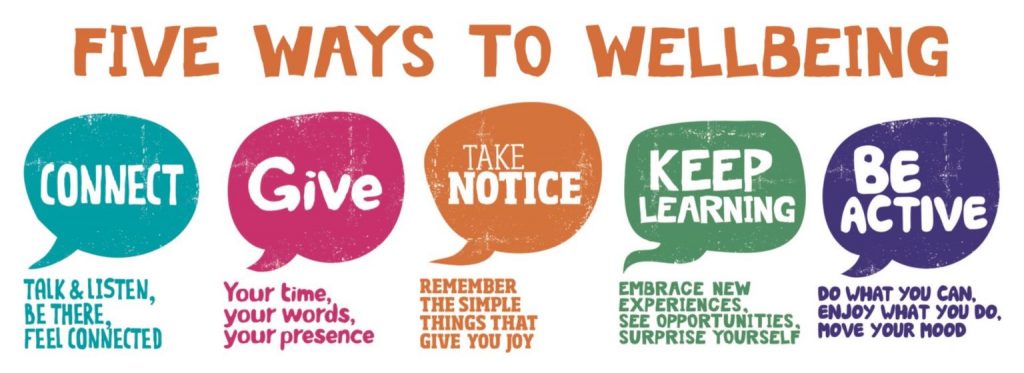Today is University Mental Health Day, a day devised to promote and champion positive support for mental health and wellbeing in Universities. You can find more information about this event over on our student pages: Together, let’s change the narrative around Mental Health
Being new in post as the Staff Wellbeing Manager, I wanted to take the opportunity to reflect on how we can all support our mental health and share pointers about the support currently available for staff.
So, what is mental health?
Mental health includes our emotional, psychological, and social well-being. It affects how we think, feel, and act. It also helps determine how we handle stress, relate to others, and make choices.
We all have mental health, just as we all have physical health. How we feel can vary from good mental wellbeing to difficult feelings and emotions, to severe mental health problems.
Our mental health isn’t set and will fluctuate and change over time and when dealing with different life stressors. When we think about mental health in the workplace its important to note that there is overlap between our personal and work lives and both will impact on each other.
Mental wellbeing: Mental wellbeing is the ability to cope with the day-to-day stresses of life, work productively, interact positively with others and realise our own potential.
To aid thinking about ways in which we can support our mental wellbeing I thought I would share the New Economics Foundation’s 5 ways to wellbeing theory. It is based around the ‘5 a day principle’ we are so used to with our fruit and veg intake!

This model looks at five key themes to aid mental wellbeing:
Connect… Be Active… Take Notice… Keep Learning… Give…
I have taken each of these themes and thought about ways in which we can implement positive engagement in each, into our working lives. These are just some suggestions.
Connect – With many of us now working in a hybrid fashion of remote working, there is less time to connect as frequently with colleagues and this can lead to a feeling of ‘disconnectedness’. Why not spend some time thinking about your connections at work, book a few catch-up meetings with people, speak to your manager about getting involved in forums and working groups on topics which interest you, or start one locally if there are gaps. You could have a look at the staff networks we have and look through our Community and Staff Events pages to find out more about things you can take part in to feel part of the wider Christ Church community.
Be Active – It is a well-known fact that exercise releases endorphins (the happy chemical in our brains) and impacts our mental health and wellbeing in a positive way. Activity doesn’t need to be strenuous and will be different for everyone. If you are interested in becoming more physically active you could sign up to Thrive, a free six-week programme that helps University staff develop a more active lifestyle and enhance their overall wellbeing. There are also staff sports and teams you could join by visiting Christ Church Sport & Active Health or you could download and take part in Christ Church Moves and gain points and rewards – there are challenges just for today to get bonus points!
Take notice – we are all at fault sometimes of being too busy, skipping lunch breaks and rushing around. Too much of this can lead to burn-out and a sense of deep dissatisfaction as there is no space to stop reflect and think. We can find ourselves running on autopilot or fighting fires, with no space to assess if there is a better way of working. Why not try this week to protect time to take a break, switch off from the gadgets, take a walk, and just be. Look at your diary and see if you can plot some reflection time in. Perhaps you can go and use our Wellbeing Wildlife Garden situated next to the Johnson building and speak to the Sustainability team about being involved in its maintenance.
If you are pushed for time perhaps you might like to listen to our daily Wellbeing Pause series or gain some inspiration about wellbeing and mental health by reading some of our wellbeing blogs.
Keep learning – This theory suggests we are happiest when we are stimulated, learning, and developing. Why not carve out some time to think about what your needs are. If you would like some help with this you can book a 1-1 session or sign up for some coaching through the People, Culture and Inclusion webpages. The site has lots of useful information, tips, and resources. We have E-learning modules, or you could hit 2 of your 5 and come and do some training in person and discuss your ideas with others. We also have apprenticeships and further qualifications Never Stop Learning.
We currently have the following specific mental health and wellbeing workshops: Mindfulness Meditation / Personal Resilience & Resourcefulness /Wellbeing and Mental Health for Managers/ Understanding and Supporting Student Mental Health
E learning – Keeping Mental Health in Mind/ Managing your own self-care and wellbeing / Mental Wellbeing and Resilience
Give – The research behind this fifth element suggests that a person’s mental wellbeing is enhanced by gaining a sense of purpose in society and contributing to their community. This could be something you already feel you do by contributing your ideas and expertise within your own teams or perhaps you would like to look at further opportunities to mentor or coach others? Coaching and Mentoring – Learning & Development Guide
The above is just one model supporting mental wellbeing and the signposts I have given are resources to help aid healthy workplace management of mental health. If however you feel you are struggling with your mental health and wellbeing please speak with your line manager, gain support from our HR partners and or take up support with the free staff counselling services CiC Employee Support
For more resources to support your mental health and wellbeing you can check out:
- Learning Resources
- Toolkit – Mental Health at Work
- Supporting our Staff to Support our Students
- Mental Health and Wellbeing – Learning & Development Guide
- The well online portal CiC Employee Support
Hazel Solly, Staff Wellbeing Manager
 People, Culture and Inclusion
People, Culture and Inclusion Juliet Flynn
Juliet Flynn 994
994


